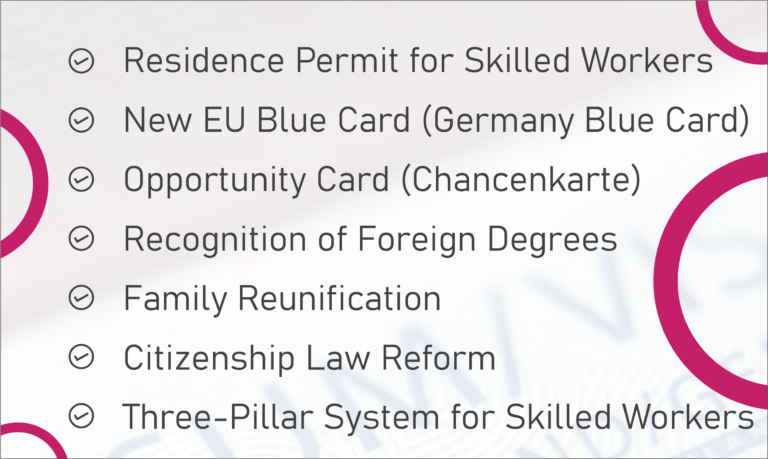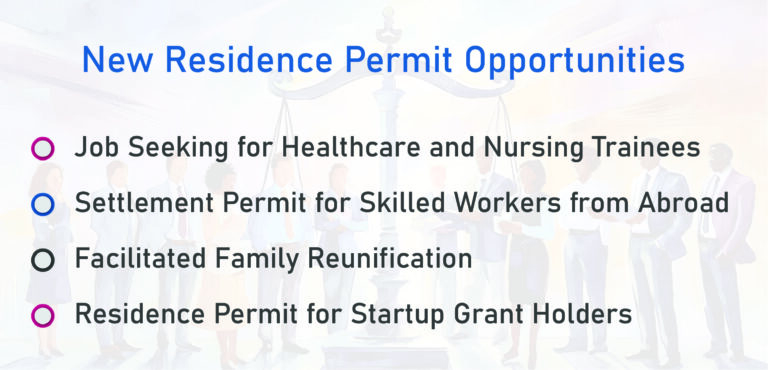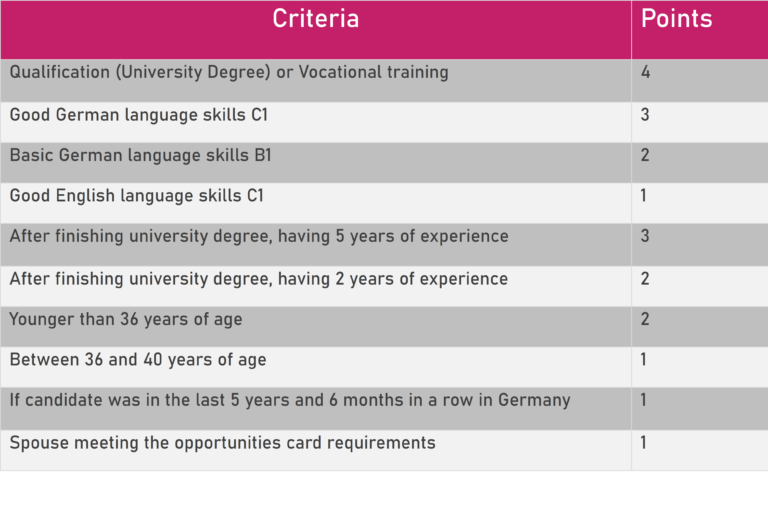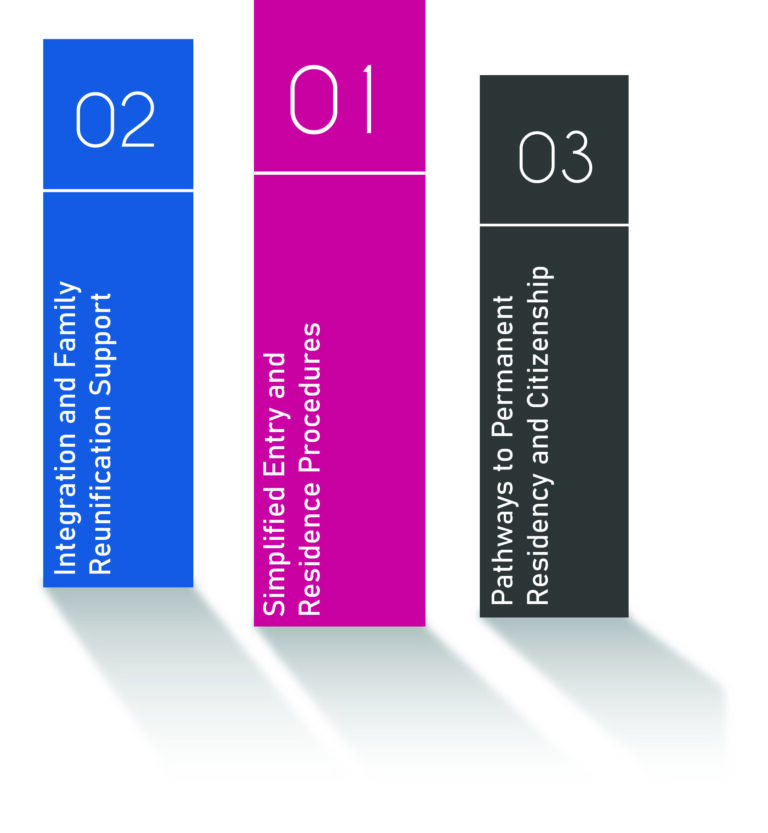Understanding the New Immigration Law in Germany
7 Key Features of the New immigration law in Germany
As the New immigration law in Germany comes into effect in 2023, it introduces several critical changes that reshape the landscape of immigration and work opportunities in the country.
These features are designed to make Germany more accessible and appealing to skilled workers from non-EU countries, addressing the growing demand in various sectors, especially in technology and IT.
Let’s delve into the specifics of these transformative features.

Residence Permit for Skilled Workers
Simplifying the Residence Permit Process
Under the new law, the process of obtaining a residence permit in Germany has become more streamlined and flexible. Skilled workers with a university degree are no longer limited to employment solely in their field of study, allowing them to pursue a wider array of job opportunities in Germany.
New Residence Permit Opportunities:
- Job Seeking for Healthcare and Nursing Trainees: Nursing and care assistants trained in Germany from third countries can now apply for a residence permit for jobseekers, valid for up to twelve months and extendable by six months.
- Settlement Permit for Skilled Workers from Abroad: Professionals holding a residence permit under the Residence Act can now receive a settlement permit after just three years, reduced from the previous four years. For EU Blue Card holders, this period is further shortened to 27 months, or 21 months with B1 level German language skills.
- Facilitated Family Reunification: Skilled workers can bring their spouses, minor children, and under certain conditions, their parents or parents-in-law, without the requirement to provide proof of sufficient living space.
- Residence Permit for Startup Grant Holders: Skilled workers receiving a grant from a German research organisation or public body for setting up a business can be granted a residence permit for up to 18 months.
These new regulations significantly ease the way for skilled professionals from various fields to contribute to the German economy

Adjusting Minimum Salary Requirements for New EU BlueCard
A significant amendment in the Germany new immigration law 2023 concerns the minimum salary to get work permit in Germany. The law introduces a more inclusive salary threshold, substantially lowering it to make Germany accessible to a wider range of skilled workers.
- For instance, the previous minimum salary requirement for non-EU workers, which was around €56,000, has been reduced to approximately €42,000.
- For professions experiencing a shortage, such as in technology sectors, the threshold has been adjusted from about €45,000 to nearly €39,000.
This crucial change aims to alleviate the skilled labor shortage in Germany and opens up the German job market to a more diverse international talent pool.
Adjusting Minimum Salary Requirements
Working in Germany, a residence permit will be needed for a non-EU individual to secure employment. A significant amendment in Germany’s new immigration law 2023 concerns the minimum salary to get a work permit in Germany. The law introduces a more inclusive salary threshold, substantially lowering it to make Germany accessible to a wider range of skilled workers
- For instance, the minimum salary for a German work permit for a highly qualified specialist is €58,400 (EU Blue Card ), and €45,552 for shortage occupations
- However, a regular residence permit for work permit for work purposes doesn’t have restrictions on salary.
This change will bring a positive impact on both the immigrants and Germany’s job market as it will increase a big number of skilled professionals and contribute to the country’s economic growth.

New EU Blue Card (Germany Blue Card)
Updates on the Minimum Salary for EU Blue Card
The new immigration law in Germany brings significant updates to the Germany Blue Card system, particularly concerning the minimum salary for the Blue Card.
This adjustment makes the Blue Card more accessible to a broader range of skilled professionals, especially in tech and IT fields. The new law reduces the minimum salary threshold, enabling more non-EU nationals to qualify for this sought-after work and residence permit.
This change is aimed at attracting more skilled workers to Germany to address the critical labor shortages in key sectors.
Continuation and Extension of the EU Blue Card System
Under the new law, existing mechanisms for skilled workers with a university degree, such as the EU Blue Card, will continue and in some cases be extended. The new EU Blue Card system, set to be implemented from November 2023, will offer enhanced short-term and long-term mobility for holders of an EU Blue Card issued by another EU Member State in Germany. This enhancement is a significant step in fostering a more flexible and dynamic approach to skilled labor mobility within the EU.
Additionally, the law introduces facilitated family reunification for EU Blue Card holders. This important development recognizes the role of family support in the successful integration of skilled professionals in Germany. By making family reunification easier for Blue Card holders, the law aims to provide a more holistic and welcoming environment for skilled workers from non-EU countries.
The Role of the Germany Blue Card in the New Immigration System
The Germany Blue Card under the new immigration law plays a pivotal role in the overall strategy of attracting and retaining high-skilled labor.
Serving as a streamlined pathway for qualified non-EU professionals to gain long-term residence and employment rights in Germany, the Blue Card aligns with Germany’s broader goals of fostering a diverse, skilled workforce and maintaining its competitive edge in the global economy.
The updated Blue Card policy is a reflection of Germany’s commitment to being an attractive destination for international talent, supporting its ongoing drive to address the “Fachkräftemangel” and empower its labor market with necessary skills and expertise.
Opportunity Card (Chancenkarte)
Introduction of Opportunity Card Germany
A key innovation in the New immigration law in Germany is the introduction of the Opportunity Card Germany, known in German as the Chancenkarte.
This new feature represents a significant step forward in Germany’s immigration strategy, particularly in attracting and retaining global talent. The Opportunity Card is designed to offer more flexible and accessible pathways for skilled workers from non-EU countries to enter the German job market.
It’s a strategic response to the urgent need for skilled professionals in various sectors, especially in technology and IT, addressing the acute Fachkräftemangel.
Opportunity Card and Its Points System
The Opportunity Card and Its Points System in Germany is a significant new policy that aims to facilitate skilled migration. This innovative approach allows individuals from abroad, who haven’t yet secured employment in Germany, to enter the country and seek job opportunities for up to a year. Here’s a detailed overview of this system:
Understanding the Point System:
The German Opportunity Card, or ‘Chancenkarte’, utilizes a point-based system for eligibility. Even if you’re not a recognized skilled worker in Germany or don’t have a formal degree or vocational training recognized there, you can qualify by accumulating sufficient points.
This points system evaluates applicants based on their educational qualifications, German language proficiency, professional experience, ties to Germany, and age. A minimum of 6 points is required for eligibility.
Below is an overview of how points are allocated:

- Work Opportunities: While holding the Opportunity Card, individuals are permitted to engage in casual work for up to 20 hours per week. This provision is beneficial for those who need financial support while searching for a qualified job.
The card also allows for probationary employment, offering both the employer and the employee a chance to assess suitability before committing to a long-term employment contract.
- Impact on Migration and Economy: This initiative is designed to attract skilled workers from around the world, helping to fill gaps in the German labor market. By providing a structured and welcoming approach to skilled migration, Germany stands to benefit from a diverse influx of talent and expertise, which is crucial for its economic growth and sustainability.
The Opportunity Card with its associated points system represents a forward-thinking approach to skilled migration, aligning Germany’s economic needs with global talent availability. It not only offers a promising pathway for skilled individuals seeking opportunities in Germany but also contributes to the country’s long-term economic development and competitiveness on the global stage.
Recognition of Foreign Degrees
Simplified Process for Skilled Immigrants
The New immigration law in Germany significantly simplifies the process of recognizing foreign degrees, a change that greatly benefits skilled immigrants.
This amendment means that skilled professionals, particularly those in tech and IT fields, no longer need to go through a lengthy and often cumbersome process to have their qualifications validated in Germany.
This streamlining is a strategic move to make Germany more attractive to international talent and to quickly integrate skilled workers into sectors experiencing Fachkräftemangel.

Family Reunification
Easing Family Reunion Visa Germany Processes
In line with the new immigration law in Germany 2023, the processes for obtaining a family reunion visa in Germany have been significantly simplified, making them more accessible and straightforward for skilled immigrants.
Updated Family Reunion Visa Policies:
- Relaxed Living Space Requirements: Spouses or minor children moving to Germany to join certain skilled workers will no longer be required to provide proof of sufficient living space. This change reduces one of the significant barriers previously faced by families during the reunification process.
- Extended Family Reunification: Skilled workers will also have the opportunity to bring their parents, and if the spouse is also a permanent resident of Germany, their parents-in-law, to join them. This provision will apply to those who receive their residence permit for the first time on or after 1 March 2024.
Impact on Immigrant Families:
These reforms acknowledge the importance of family unity and are designed to make the transition smoother for skilled immigrants relocating to Germany. By facilitating family reunification, the new law not only enhances the social integration of immigrants but also contributes to their overall well-being and productivity in the German workforce.
With these changes, Germany is positioning itself as a more family-friendly destination for skilled professionals, recognizing that the support system provided by the family is crucial for successful integration and long-term settlement.
Citizenship Law Reform
Germany New Immigration Law Citizenship Aspects
A significant aspect of the new legislation is the Germany new immigration law citizenship reform.
This reform is part of a broader effort to liberalise conditions for non-Germans seeking citizenship, reflecting an inclusive approach to immigration. The new law aims to simplify the path to German citizenship for skilled immigrants, recognizing their contribution to the country’s economy and society.
This change is expected to encourage more skilled workers to consider long-term settlement in Germany, further strengthening the country’s position as a desirable destination for global talent.
Three-Pillar System for Skilled Workers
Comprehensive Approach to Skilled Immigration
The New immigration law in Germany introduces a groundbreaking Three-Pillar System for Skilled Workers, which represents a comprehensive approach to addressing the nation’s skilled labor needs.
This system is a core component of the Germany new immigration law 2023 and is designed to streamline and enhance the immigration process for skilled workers from non-EU countries.
The three pillars of this system are as follows:
- Simplified Entry and Residence Procedures: This pillar focuses on easing the entry and residence processes for skilled workers. It includes the simplification of visa procedures, recognition of foreign qualifications, and the introduction of the Opportunity Card (Chancenkarte), making Germany more accessible to skilled talent.
- Integration and Family Reunification Support: Recognizing the importance of social integration, this pillar aims to facilitate the assimilation of skilled workers into German society. It includes measures to ease family reunion visa Germany processes, ensuring that skilled workers can bring their families with them, which is crucial for long-term settlement and integration.
- Pathways to Permanent Residency and Citizenship: The third pillar focuses on providing clear and accessible paths to permanent residency and citizenship, as part of the Germany new immigration law citizenship reforms. This aspect of the system is designed to encourage skilled workers to make long-term commitments to living and working in Germany, contributing to the country’s economic and cultural fabric.
This Three-Pillar System reflects a holistic approach to skilled immigration, addressing not only the immediate economic needs but also the long-term societal integration of skilled workers in Germany.
It signifies a significant shift in Germany’s immigration policy, aligning it with the evolving global landscape of talent mobility and acknowledging the vital role of skilled immigrants in driving innovation and growth.

The Impact of the New Immigration Law in Germany
The New immigration law in Germany has far-reaching implications for various groups, particularly those whose skills are in high demand in the German job market.
The German federal government estimates that the act will enable an additional 60,000 qualified third-country nationals to enter the country for employment, qualification measures, or job search. This influx of talent is expected to significantly contribute to sectors facing labour shortages, particularly in technology and IT.
This section delves into the specific impacts of the law on two key groups: software engineers and other tech professionals, and general job seekers, highlighting how the law caters to their unique needs and aspirations.
Software Engineers and Tech Professionals
Implications for Tech and IT Professionals in Germany
For Tech and IT professionals in Germany, the new immigration law opens up a plethora of opportunities. Software engineers and other tech experts, especially from non-EU countries, stand to benefit significantly from the relaxed requirements and streamlined processes.
The lowered minimum salary for the Blue Card and the introduction of the Opportunity Card (Chancenkarte) are particularly beneficial, as they offer easier access to the German job market.
These changes acknowledge the crucial role that tech professionals play in driving innovation and competitiveness in Germany’s tech industry, which has been grappling with the issue of Fachkräftemangel.
Job Seekers
Understanding the Job Seeker Visa Germany
For general job seekers, the job seeker visa Germany becomes more accessible under the new law. This visa category allows individuals from non-EU countries to enter Germany for the purpose of seeking employment.
With the new regulations, the process of obtaining a job seeker visa is expected to be more straightforward, enabling a larger number of skilled individuals to explore employment opportunities in Germany.
This aspect of the law is particularly important for those who may not yet have a job offer but possess the skills and qualifications in demand in the German job market.
Families and Dependents
Facilitating Family Integration with Work Visa Germany
The New immigration law in Germany significantly enhances the provisions for families and dependents of skilled workers, playing a pivotal role in facilitating their integration into German society. This aspect of the law is especially crucial for those obtaining a work visa Germany, as it directly impacts their decision to move and settle in a new country.
Under the new law, the process of bringing family members to Germany has been streamlined and made more accessible. This includes spouses, children, and, in some cases, extended family members like parents and parents-in-law.
The law recognizes the importance of family support for the well-being and success of skilled workers in a new environment.
Key aspects include:
- Easier Family Reunion Procedures: The new immigration law simplifies the family reunion visa Germany process, reducing bureaucratic hurdles and wait times. This change is particularly beneficial for skilled workers who wish to bring their families along when they move to Germany for work.
- Support for Dependents: Dependents of those holding a work visa Germany are provided with better support, including access to language courses and integration programs. This support is crucial for the family members to adapt to their new environment and become active, contributing members of the community.
- Long-Term Stability and Integration: By facilitating family integration, the new law provides a sense of long-term stability for skilled workers and their families. This is not just beneficial for the individuals involved but also for Germany’s broader goal of attracting and retaining global talent.
Practical Implications and Challenges of the New Immigration Law in Germany
The New immigration law in Germany brings about a range of practical implications and challenges that need to be navigated by both immigrants and the entities involved in the process. This section addresses three critical areas: bureaucratic processes, employment prospects, and the response of companies to these changes.
Bureaucratic Processes
Dealing with Ausländerbehörde Under the New Law
One of the significant challenges under the new law involves dealing with the Ausländerbehörde or the Foreigners’ Office.
While the law aims to simplify and streamline immigration procedures, the actual on-ground implementation by bureaucratic entities like the Ausländerbehörde will play a crucial role in determining the effectiveness of these reforms.
Applicants may still face complexities in navigating these administrative processes, and there may be a transitional period as officials adapt to the new regulations and requirements.
Employment Prospects
Exploring English Speaking Jobs in Germany and Jobs in Germany with Visa Sponsorship
For non-German speaking skilled workers, particularly in tech and IT sectors, the new law opens up opportunities to explore English speaking jobs in Germany.
Additionally, the law is likely to encourage more companies to offer jobs in Germany with visa sponsorship, thereby increasing employment opportunities for international talent.
However, job seekers must still navigate the competitive job market and may face challenges such as cultural differences, skill recognition, and adaptation to German workplace norms.
Adaptation by Companies
How Businesses Might Respond to Germany Immigration Law Changes
The Germany immigration law changes are expected to prompt a significant response from German businesses, especially those in sectors facing skill shortages.
Companies may need to adapt their recruitment strategies, including simplifying visa sponsorship processes and creating more inclusive work environments for international employees.
However, businesses might also face challenges in adapting to these new regulations, ensuring compliance, and integrating a more diverse workforce. The response of the corporate sector will be instrumental in determining how effectively the new law meets its objectives of attracting and retaining global talent.
Preparing for the Change
As the New immigration law in Germany rolls out, both potential immigrants and local entities must prepare for the changes it brings. This preparation is key to maximising the benefits of the law and ensuring a smooth transition for all parties involved.
Two critical areas of preparation include job market readiness and navigating the updated legal landscape.
Navigating the Legal Landscape
Understanding Germany Work Visa Requirements in the New Context. Navigating the new legal landscape, particularly understanding the Germany work visa requirements under the revised law, is a crucial aspect of preparation for potential immigrants.

Updated Work Visa Requirements:
- Qualification Recognition: Your qualification must be recognized in Germany or comparable to a German degree. For regulated professions like healthcare, a license to practice in Germany is required. More information on this recognition process can be found in the “Recognition” section.
- Specific Job Offer: You need a specific job offer from an employer in Germany. The job must be a qualified position, typically requiring a degree or qualified vocational training.
- Flexibility in Professional Alignment: Your job in Germany does not have to be related to your professional qualifications. However, for regulated professions, a license to practice is necessary.
- Salary Requirements for Applicants Over 45: If you are over 45 years old and coming to work in Germany for the first time, the job must offer a gross annual salary of at least €48,180 (as of 2023), or you must have adequate pension provision.
Importance of Accurate Information and Consultation:
For prospective immigrants, familiarizing themselves with these visa requirements and the application process including The approval of the Federal Employment Agency, as redefined by the new immigration law, is essential. Accurate and updated information is vital for a successful visa application and ensuring compliance with immigration regulations in Germany.
Consulting with immigration experts or legal advisors can help navigate this landscape effectively, avoiding common pitfalls and streamlining the journey towards establishing a career in Germany. By being well-informed and prepared, potential immigrants can navigate the complexities of the German visa system with greater ease and confidence.
Conclusion
The New immigration law in Germany represents a transformative approach to addressing the country’s labor shortages, especially in high-demand sectors like technology and IT.
By easing residence permit processes, adjusting work permit salary thresholds, and introducing the Opportunity Card (Chancenkarte), the law aims to attract a broader spectrum of global talent. These changes not only facilitate easier access for skilled workers but also enhance family reunification and pathways to citizenship, underlining the importance of social integration.
The New immigration law in Germany is a significant step towards a more inclusive and dynamic future, reflecting Germany’s commitment to a progressive and globally integrated approach to immigration.
Frequently Asked Questions (FAQs): The New Immigration Law Germany
1. What changes does the new immigration law bring for software engineers from non-EU countries who already qualify for the EU Blue Card?
- Answer: The new law eases the process for software engineers from non-EU countries who qualify for the EU Blue Card. It includes lowering the minimum salary threshold, thereby making it easier for these professionals to work in Germany. Additionally, the law simplifies the process of changing employers and enhances mobility within the EU.
- Answer: The new immigration law has been approved by the German Federal Parliament and is set to come into effect starting from November 18, 2024.
The German government gave its final approval for the law in July this year.
The BlueCard takes effect from 18th November 2023, and the Opportunity Card takes effect from 1st June 2024. The government-approved law will help attract a large number of non-EU job seekers and combat the labor shortage in the country.
3. How does the Opportunity Card (Chancenkarte) benefit skilled workers under the new law?
- Answer: The Opportunity Card allows skilled workers, especially in sectors like tech and IT, to come to Germany for a year to seek employment without having a job offer in hand. It’s based on a points system, considering factors like education and work experience.
4. What are the key features of the new immigration law in Germany?
- Answer: Key features include a more accessible residence permit process for skilled workers, the introduction of the Opportunity Card, easier family reunification, and reforms in citizenship law. It also includes adjustments in the EU Blue Card system, particularly in salary thresholds and job mobility.
5. How does the new law impact family reunification for skilled workers in Germany?
- Answer: The new law makes family reunification easier for skilled workers. It streamlines the visa process for family members, allowing them to join the primary visa holder in Germany more efficiently, which is vital for long-term settlement and integration.
6. Do I need to wait for approval and obtain a new Zusatzblatt from the Ausländerbehörde when changing employers within the initial 12 months of employment?
- Answer: Yes, you should get permission, if you want to change your employer under 2 years. Unless you have worked in Germany for 2 years with an EU Blue card, you need to inform the German authorities about switching your job.
- Your new job must be of similar profession as mentioned on your Blue Card / Zusatzblatt
- You must meet the requirements for the EU Blue Card again
- You must apply to your local Foreigners Office (Ausländerbehörde)
The overall processing time for changing jobs on EU Blue Card can take from 2 weeks to 12 weeks. This is quite long, however, you can make use of services to improve the processing time.
Approved new immigration law is set to come into effect starting from November 18, 2024. After the new legislation, it still requires interaction with the Ausländerbehörde or Foreigners’ Office.




